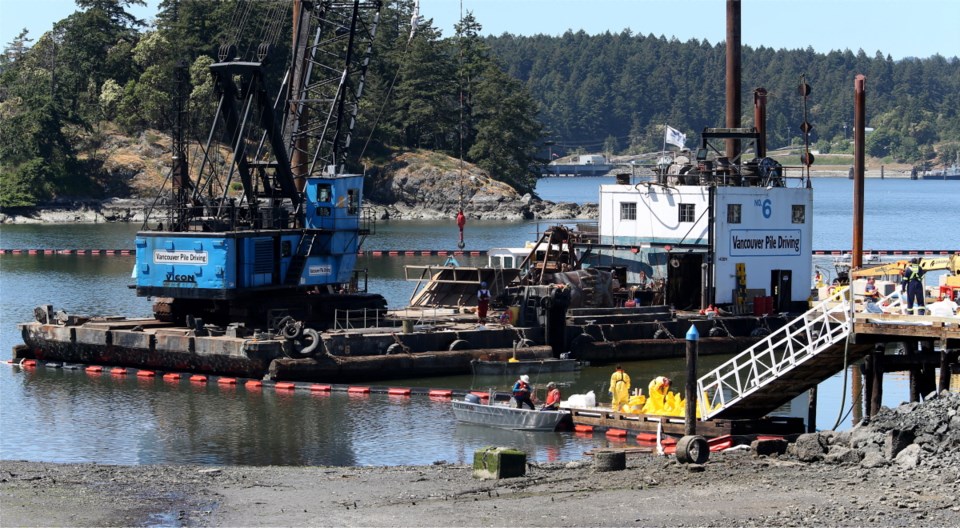Fisheries and Oceans Canada is prohibiting the harvesting of all fish species in Esquimalt Harbour after a barge ran aground and dumped about 27,000 litres of diesel into Plumper Bay on Sunday.
Island Health and the First Nations Health Authority are also advising people and pets to stay clear of the water and shoreline.
Vancouver Pile Driving said its construction barge broke loose in high winds early Sunday morning. The barge, which carries a crane, ran aground on the flat, sandy and rock-strewn beach, which is ringed by Esquimalt Nation on one side and Songhees Nation on the other.
Cleanup crews were on scene by 1 p.m. Sunday and skimmed the water’s surface throughout the night. By Monday afternoon, about 27,000 litres of diesel had been recovered and the marine portion of the cleanup was deemed complete.
Environmental field experts surveyed the damage in order to devise a shoreline and wildlife recovery plan. A coast guard helicopter also observed the extent of the spill.
A Canada goose and three goslings were found covered in oil.
Because the avian wildlife were only “lightly impacted” and behaving regularly — entering the water, something they wouldn’t do if their feathers were heavy with fuel — they will be monitored rather than captured, said Michael Lowry of Western Canada Marine Response, which is heading up the marine response and cleanup.
B.C. Environment Ministry wildlife biologist Trudy Chatwin observed a blue heron — considered a species at risk — with dark markings on Monday, but said they appeared to be natural and not from fuel.
The shoreline cleanup was expected to begin late Tuesday. That includes flushing of the beach — similar to a slow pressure wash — in selected areas where high concentrations of fuel were found, mostly in the immediate area around the barge. The diesel-tainted water flushed into the bay will be collected by booms put in place to capture the run-off.
During this washing process, the avian wildlife in the area — including Canada geese, at least one blue heron, seagulls and crows — may be forced from the area so they don’t come in contact with the oily water, Lowry said. After the flush, shellfish and marine life in the area will be sampled, she said.
Focus Wildlife Canada president Chris Battaglia, a veteran emergency responder to oiled wildlife emergencies, said the flushing of the shoreline will be monitored and if avian wildlife, for example, are in the area of concern they will be encouraged to leave.
While cannon blasts are most common, Battaglia said most likely more simple diversion and exclusion tactics — such as fences — will be used. In addition, the machines and human activity involved in brushing and flushing the beach will likely be enough to keep geese away, for example.
The harbour master with the Department of National Defence was credited for its quick action in putting out the initial boom and containing much of the spill.
But Pauline Haines credits her husband and neighbours for taking action long before the harbour master knew of the banked barge.
Ed Haines said he contacted the harbour master via marine radio and had to convince them the barge had broken free. There were two barges in the area on mooring buoys and harbour master cameras couldn’t see the one that was aground, he said.
Ed Haines said the line holding the barge was “skookum” but broke in the stormy seas. Given the Environment Canada weather forecast warning of high winds, the couple believes a second line would have been “prudent.” The Haineses said there are several blue herons and river otters in the area.
“We View Royal waterfront residents are extremely lucky that the wind direction was such that the barge headed in a mostly easterly direction,” Pauline Haines said. “Had the wind been more southeast, our docks [and] boats would have been destroyed.”



